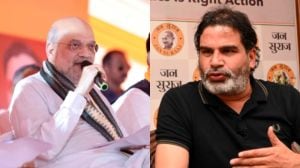He raised art of caricature to the level of painting
Its rather difficult to talk about oneself, Shrilal Shukla,fumbling for words,once told an interviewer in a film made on him by the Sahitya Akademi.
Its rather difficult to talk about oneself, Shrilal Shukla,fumbling for words,once told an interviewer in a film made on him by the Sahitya Akademi.
That tells about the reticent writer,who was conveniently,but wrongly,termed a satirist on the basis of his Sahitya Akademi-winning novel Raag Darbaari.
Even when the Bharatiya Jnanpith recently announced that the countrys topmost literary award for 2009 and the prize amount would be divided between two Hindi writers Shukla and Amarkant he only welcomed it while several veteran writers criticised the move,saying it was an insult to the language and its writers.
Widely considered among the best Hindi novels of the last century with a grand national narrative,Raag Darbaari portrayed a feudal,crumbling Shivpalganj that remains the archetypal village of Hindi heartland with politico-cultural tension.
Credit it to the creative vision of the writer that despite delving into almost everything decadent in the system,he stops short of making a moral statement. The novel does not have a villain,prompting a critic to say the novel raises the art of caricature to the level of painting. The craft of the novel,clearly,was taken to a height where it did not remain a mere satire.
Shukla was born in 1925. An Uttar Pradesh PCS officer,he was later elevated to IAS rank. He graduated from Allahabad University. His first novel Sooni Ghati Ka Sooraj published in 1957 made him the youngest Hindi writer then to win the Sahitya Akademi award in 1970.
In Visrampur ka Sant,Shukla returned to critique the status of Gandhian values in the post-Independence India through a decaying politician,who undergoes a change of heart in the end.
Despite being a bureaucrat,he was uninhibited in his works when it came to depict the moth-eaten system and its red tape. Hamare desh ka kanoon bahut pakka hai. Jaisa aadmi,vaisi adalat (our country has very sound legal system courts as per the litigant), he wrote in one of his novels.
Shukla won several other awards for his contribution to Hindi literature,including Padma Bhushan and Vyas Samman.
Only 10 days ago,on October 18,he was conferred the Jnanpith award on hospital bed by UP Governor B L Joshi.
Shukla,who suffered from Parkinsons disease,had been undergoing treatment for lung infection since October 16 at Lucknows Sahara Hospital. The award was announced on September 19.
With ENS,Lucknow



- 01
- 02
- 03
- 04
- 05




























